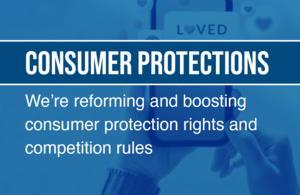
The government have announced new plans to shield the public from rip-offs and to end unfair business practices that hamper fair competition.
The average UK household spends around £900 each year influenced by online reviews and spends £60 on unwanted subscriptions. Competitive markets create a level playing field for businesses and give consumers better products, greater choice, and lower prices by encouraging companies to compete for customers.
Plans include making it clearly illegal to pay someone to write or host a fake review, so people are not cheated by bogus ratings, and clearer rules for businesses to make it easier for consumers to opt out of subscriptions so they are not stuck paying for things they no longer want.
Prepayment schemes like Christmas savings clubs will have to fully safeguard customers’ money through insurance or trust accounts. This will prevent scandals like Farepak, in which the business went bust and thousands of people lost their money.
To beef up the enforcement of consumer protections, the government is delivering on its manifesto promise to give the Competition and Markets Authority (CMA) enhanced powers to tackle rip-offs and bad business practices. The CMA will have stronger tools to tackle companies colluding to bump-up prices and to combat ‘killer acquisitions’ in which big businesses snap up rivals before they can launch new products or services.
The CMA will be able to directly enforce consumer law, including new powers to fine firms up to 10% of their global turnover for mistreating customers. This replaces going through a court process which can take years.
The reforms underline the government’s commitment to seizing the opportunities provided by leaving the EU and adapting to the lessons of the pandemic, which has accelerated the trend towards online shopping and cast a spotlight on bad business practices like fake reviews.
Strengthening consumer protection and enforcement
The government is bolstering consumer rights, strengthening the enforcement powers of the CMA, and supporting consumers in resolving their own disputes without having to go the courts. Fake reviews will be tackled by consulting on a new law against:
-
commissioning someone to write or submit a fake review
-
hosting consumer reviews without taking reasonable steps to check they are genuine
-
offering or advertising to submit, commission or facilitate fake reviews
‘Subscription traps’ in which businesses make it difficult to exit a contract will also be stopped. Under new rules, businesses must:
-
provide clearer information to consumers before they enter a subscription contract
-
issue a reminder to consumers that a free trial or low-cost introductory offer is coming to an end, and a reminder before a contract auto-renews onto a new term
-
ensure consumers can exit a contract in a straightforward, cost-effective and timely way
The enforcement of consumer law is also being strengthened. In the 3 years from 2018 to 2019 to 2020 to 2021, the CMA’s actions provided a direct financial benefit to consumers worth £7.7 billion. Today’s announcement will build on this success.
The CMA, instead of a court, will be able to award compensation to consumers and directly impose financial penalties for:
-
breaking consumer protection laws, with penalties worth up to 10% of global annual turnover for businesses or up to £300,000 in the case of an individual
-
breaching undertakings given to the CMA, with penalties worth up to 5% of a business’ annual global turnover or up to £150,000 for an individual, and additional daily penalties for continued non-compliance
-
non-compliance with an information notice, concealing evidence or providing false information, with penalties worth up to 1% of a business’ annual global turnover or up to £30,000 for an individual, and additional daily penalties for continued non-compliance
The government is also supporting consumers and traders to resolve more disputes without court action by improving Alternative Dispute Resolution (ADR) services in consumer markets. This includes amending the ADRRegulations 2015 to improve the quality and oversight of ADR services, and requiring businesses offering consumers dispute resolution services to be accredited against these regulations.
Today’s new measures to shield online consumers from rip-offs including fake reviews and subscription traps will apply in England, Scotland and Wales. Consumer protection is devolved in Northern Ireland.
Boosting competition
Illegal anticompetitive conduct will be tackled through new measures including strengthening the CMA’s evidence-gathering powers and ensuring competition law protects UK consumers from anticompetitive conduct wherever it is carried out, such as companies colluding to bump up prices. Government is also increasing the ability for the CMA to fine businesses abusing their market position, even in smaller markets, by reducing the minimum turnover threshold for immunity from financial penalties from £50 million to £20 million.
On mergers, to reduce bureaucracy and keep the burden on smaller businesses to a minimum, government will exclude mergers between small businesses – where each party’s UK turnover is less than £10 million – from the CMA’s merger control altogether. The government is also improving the CMA’s ability to review ‘killer acquisitions’ where big businesses snap up prospective rivals before they can launch new services or products.
The government is giving the CMA greater powers to sanction companies refusing to comply with investigations and remedies. Penalties worth up to 1% of a business’ annual worldwide turnover can be imposed for non-compliance with the CMA’s investigative measures, and up to 5% of annual turnover for non-compliance with remedies. Additional daily penalties can be applied if non-compliance continues.
So the CMA can use market inquiries to its full potential, the government is creating more opportunities for firms to offer binding commitments to resolve concerns, as well as the ability for the CMA to apply more flexible market investigation remedies.


